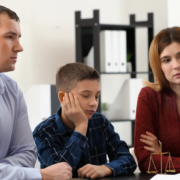While there is no such thing as a “perfect” home, a child must have a safe, stable, and healthy environment in which to live. If you believe that your former spouse or partner is putting the mental, physical, or emotional safety of your child at risk by not maintaining a home suitable for visitation, keep reading to learn more about your options.
What Really Makes a Home Unfit for Child Visitation?
Whether a home is actually adequate for a child to live in or visit depends on numerous factors. A judge can evaluate if an environment meets the overall criteria, looking specifically for objective signs that the home is suitable, comfortable, and safe for children.
Obvious signs of unsuitability include substance abuse, domestic violence, and physical abuse. In these situations, the other parent can be ruled unfit, and the court can remove the child from the home.
There are also more subtle clues that a parent’s home is genuinely unsuitable for visitation. For example, an unclean, a hoarding situation, or a lack of basic needs (like utilities being deactivated), clearly indicate that the parent is ill-equipped to provide a home appropriate for visitation.
Additional factors may also come into play. For example, if the other parent is neglecting the child or not being responsive to their needs, that could be a sign that the environment is unsuitable. While there can be universal guidelines, many of these judgments may come down to an individual situation based on the age of the child and the current and past rules set by or agreed upon by the parents.
Legal Options To Protect a Child From an Unsuitable Home
One of the first steps in protecting a child from having to spend time in a home that is unsuitable for visitation is to gather evidence of an unsafe visitation environment. This can involve documenting your concerns and communicating constructively with the other parent.
In keeping with the goal of protecting the best interests of the child, anyone who suspects abuse or neglect can report the situation to Child Protective Services. This initiates an investigation and includes interviews, home observations, and reports, which can be used as evidence in court.
A family law attorney can guide you in pursuing legal actions such as filing a petition to restrict visitation due to unfit home conditions or pursuing child custody modifications due to unsafe conditions. If there is concern that both parents’ homes are unsuitable for visitation, the next step may be to explore alternative solutions such as conducting visitations at a neutral site.
Contact an Experienced Family Law Attorney
Every child deserves to grow up and thrive in a truly safe and healthy environment. At Karen Ann Ulmer, P.C., our law firm takes an empathetic and compassionate approach to resolving child custody conflicts, including those centered around safety.
To learn more about how our attorneys can help you, call us at 866-349-4907 for a consultation.





